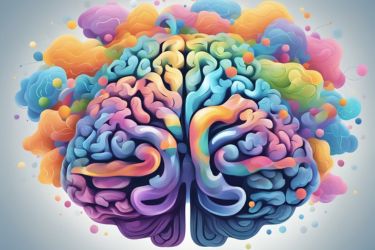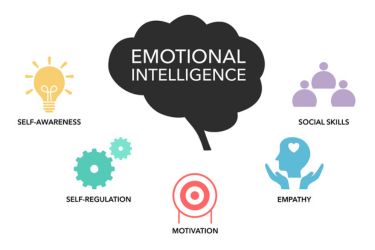Emotional intelligence, often referred to as EQ, plays a crucial role in our personal growth and self-awareness. By understanding our emotions and how they affect our interactions with others, we can enhance our relationships and make better decisions. This set of skills helps us recognise our strengths and weaknesses, allowing us to navigate life’s challenges with greater ease.

As we deepen our self-awareness, we also gain insight into what drives our reactions. This can lead to improved mental well-being and a greater ability to empathise with those around us. Unlike traditional intelligence, measured by IQ, emotional intelligence focuses on our ability to connect with ourselves and others on a more profound level.
Developing our emotional intelligence is not just beneficial for personal growth; it also positively impacts our professional lives. By honing our ability to understand and manage emotions, we open doors to new opportunities and stronger connections. This journey towards greater self-awareness can lead to a more fulfilled life.
Foundations of Emotional Intelligence

Emotional intelligence (EI) plays a crucial role in personal development and self-awareness. It involves understanding our emotions and those of others. This section discusses the core elements of emotional intelligence, how it differs from cognitive abilities, and the models that frame our understanding of EI.
Understanding Emotional Intelligence
Emotional intelligence refers to our ability to recognise and manage our emotions and understand the feelings of others. This skill set is essential in both personal and professional settings.
There are five key components:
- Self-awareness: Knowing our emotions and their impact.
- Self-management: Controlling our emotions in various situations.
- Social awareness: Recognising others' feelings and needs.
- Relationship management: Handling interactions empathetically.
- Emotional awareness: Being in tune with our emotional state.
By improving our emotional intelligence, we enhance our interactions and build stronger connections.
The Emotional Quotient Vs. Intelligence Quotient
The Emotional Quotient (EQ) differs significantly from the Intelligence Quotient (IQ). While IQ measures cognitive abilities like reasoning and problem-solving, EQ focuses on our emotional skills.
Having a high IQ does not guarantee success or happiness. In many cases, a higher EQ can lead to better relationships, improved mental health, and greater professional achievements.
Research indicates that leaders with high emotional intelligence often excel in their roles, as they understand their team's emotions. This knowledge fosters a positive work environment and promotes collaboration.
The Models of EI and Their Components
Several models describe emotional intelligence and its components. One widely referenced model is Daniel Goleman’s framework, which outlines four key areas:
- Self-awareness
- Self-management
- Social awareness
- Relationship management
Each of these areas plays a critical role in how we interact with ourselves and others. Another model divides EI into five clusters: emotional perception, emotional facilitation, emotional understanding, emotional management, and emotional growth.
Understanding these models helps us recognise how our emotional skills contribute to personal growth. By focusing on these core areas, we can actively enhance our emotional intelligence for better relationships and personal success.
Building Self-Awareness

Self-awareness is crucial for personal growth. It helps us understand our emotions and how they affect our behaviour and relationships. By focusing on self-assessment and using effective tools, we can enhance our self-knowledge and emotional intelligence.
Importance of Self-Assessment
Self-assessment allows us to reflect on our thoughts and feelings. This process is vital for recognising our strengths and weaknesses. Regularly evaluating ourselves helps to identify patterns in our behaviour and emotional responses.
We can ask ourselves questions like:
- What triggers my emotions?
- How do I react in stress?
- What are my core values?
By answering these questions, we gain clearer insight into our motivations. This knowledge enables us to make informed decisions and better control our reactions in various situations.
Tools and Techniques for Increased Self-Knowledge
There are several practical tools we can use to develop self-awareness. Journaling is a simple yet effective method. It helps us track our emotions and thoughts over time.
Mindfulness exercises can also be beneficial. Taking a few moments daily to focus on our breathing can improve our ability to stay present and attentive to our feelings.
We might consider using 360-degree feedback from friends and colleagues. This feedback offers diverse perspectives on our behaviour, highlighting areas for improvement.
Incorporating quizzes or self-assessment tools online can provide additional insights. These resources help us better understand our personality traits and emotional triggers.
Mastering Self-Management

Self-management is essential for personal growth. It involves regulating our emotions, adapting to challenges, and staying focused on long-term goals. We can enhance our emotional intelligence by mastering these skills, improving our decision-making and relationships.
Emotional Regulation and Self-Control
Emotional regulation is the ability to manage our feelings in different situations. We can practise this by identifying our emotional triggers. For instance, if we know that stress makes us anxious, we can use techniques like deep breathing or mindfulness to regain control.
Self-control is about resisting instant impulses for greater rewards later. We must learn to pause and assess situations before reacting. For example, instead of yelling when frustrated, we can take a moment to think and respond calmly. This not only keeps our emotions in check but also builds self-confidence and respect from others.
Developing Resilience: The Art of Bouncing Back
Resilience helps us cope with setbacks. When faced with challenges, our ability to bounce back is crucial. To strengthen our resilience, we can reflect on past experiences and learn from them.
Adopting a positive mindset also plays a vital role. We should remind ourselves that failure is part of growth. Practising adaptability in the face of change allows us to overcome obstacles and maintain focus on our personal goals.
By surrounding ourselves with supportive people, we can enhance our resilience. Having a network strengthens our belief in ourselves and provides encouragement when we face difficulties.
Delaying Gratification for Long-Term Goals
Delaying gratification is a key skill in achieving our long-term goals. It involves making choices that benefit us in the future rather than seeking immediate pleasure. We can improve our ability to delay gratification through practice and self-awareness.
Setting clear goals helps us stay grounded. When we focus on what we truly want, we find it easier to resist short-term temptations. For example, choosing to save money for a holiday instead of spending it on small purchases reflects smart self-management.
Having a plan in place is also beneficial. By breaking our goals into smaller steps, we can celebrate quick wins, boosting our motivation. This practice not only reinforces our discipline but also enhances our confidence as we make progress toward our objectives.
Communication and Social Skills

Effective communication is crucial for personal growth and developing strong relationships. We enhance our social skills through empathy, active listening, and solid relationship management. These elements help us connect better with others and navigate social situations.
The Role of Empathy in Effective Communication
Empathy enables us to understand the feelings and perspectives of others. By putting ourselves in someone else’s shoes, we can communicate more meaningfully. This understanding fosters trust and promotes open dialogues.
Some ways to practise empathy include:
- Reflecting feelings: Acknowledge what others express.
- Asking questions: Show interest in their thoughts and emotions.
- Sharing experiences: Relate to their feelings without overshadowing them.
Empathy not only enhances our communication skills but also helps deepen our connections.
Active Listening and Relationship Management
Active listening is a key part of effective communication. It goes beyond just hearing words; it involves fully engaging with the speaker. We can practise active listening by:
- Maintaining eye contact: This shows that we are focused on the speaker.
- Nodding and using verbal affirmations: These actions encourage the speaker to continue.
- Paraphrasing: This confirms our understanding of their message.
These techniques strengthen our interpersonal skills and allow us to manage relationships better. When we listen actively, we can respond more thoughtfully, fostering healthier interactions.
Navigating Social Networks and Building Relationships
Building relationships requires an awareness of our social environment. We need to understand group dynamics and how to approach others in various settings.
To build meaningful connections, we should:
- Seek common interests: This gives us a solid foundation for conversations.
- Be approachable: A friendly demeanor invites others to engage with us.
- Attend social events: This expands our network and offers new opportunities.
With strong social awareness, we can enhance our ability to communicate effectively, making it easier to forge lasting relationships.
Emotional Intelligence in Leadership
Emotional intelligence plays a crucial role in effective leadership. It helps us inspire and motivate our teams, build resilience, and make sound decisions, even in challenging situations.
Inspiring and Motivating Others
In leadership, our ability to inspire others is vital. Emotional intelligence allows us to connect with our team members on a personal level. By understanding their emotions, we can recognise their strengths and challenges.
When we show empathy, we can offer emotional support that boosts motivation. For instance, acknowledging an employee's hard work can foster a sense of commitment. We can also create an environment that encourages open communication. This strengthens collaboration and trust within the team.
Developing Personal and Team Resilience
Resilience is important for both personal growth and team success. Leaders with high emotional intelligence can help their teams bounce back from setbacks. By modelling emotional resilience, we set a strong example for our team.
We can teach our team to manage stress and adapt to change. This not only helps in facing daily challenges but also in dealing with conflicts. When team members feel supported, they are more likely to collaborate effectively and stay committed to common goals.
Innovation and Decision-Making under Pressure
Effective leaders must make informed decisions, especially during high-pressure situations. Emotional intelligence aids in this process by allowing us to remain calm and focused. When we manage our own emotions, we can better evaluate the options at hand.
Our empathy helps us consider different perspectives when making decisions. This can lead to innovative solutions that benefit the team and organisation. We can also recognise when teamwork is needed. Encouraging group discussions can enhance creativity and conflict resolution.
By embracing these aspects of emotional intelligence, we can elevate our leadership skills and create a thriving work environment.
Personal Development and Mental Health
In our journey of personal development, understanding emotional intelligence (EI) plays a crucial role in enhancing our mental health. Our ability to recognise and manage emotional states can lead to improved well-being, greater optimism, and increased productivity.
Emotional Intelligence for Personal Growth
Emotional intelligence is key to personal growth. By increasing our self-awareness, we can better understand our emotions and how they influence our thoughts and actions.
When we recognise our emotional triggers, we can respond thoughtfully rather than react impulsively. This capability helps in transforming negative emotional reactions into more constructive responses.
For example, when faced with frustration, instead of letting it lead to anger, we can take a moment to breathe and reflect. By practicing emotional awareness, we can nurture intrinsic motivation and promote a positive mindset.
Enhancing Mental Well-Being through EI
Enhancing our mental well-being can be significantly influenced by our EI. Effective emotional management allows us to navigate stress and anxiety more smoothly.
When we practice recognising our emotions, we improve our ability to cope with challenges. This process helps us to not only manage our emotional states but also fosters resilience.
Moreover, a strong sense of emotional clarity contributes to optimism. By focusing on our strengths and achievements, we can break the negative cycle of self-doubt, leading to greater productivity in both personal and professional contexts.
The Role of Mindfulness in Emotional Clarity
Mindfulness is a powerful tool that complements our emotional intelligence. It helps us to stay present and aware of our thoughts and feelings without judgement.
Through mindfulness practices, such as deep breathing or meditation, we can gain insight into our emotional states. This awareness reduces the chances of emotional hijacking, allowing us to respond to situations more effectively.
As a result, we can cultivate a sense of inner peace and clarity. By integrating mindfulness into our daily routines, we promote our overall mental health and establish a stronger foundation for personal growth.





















